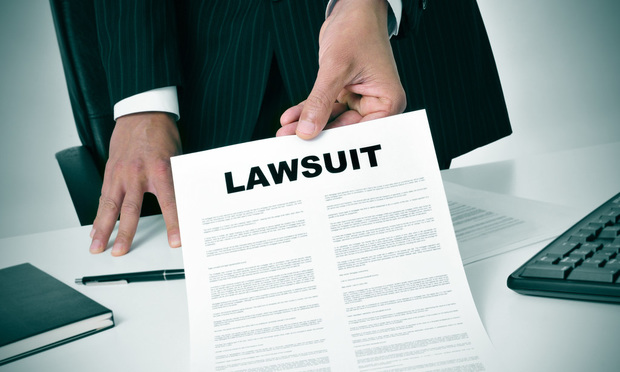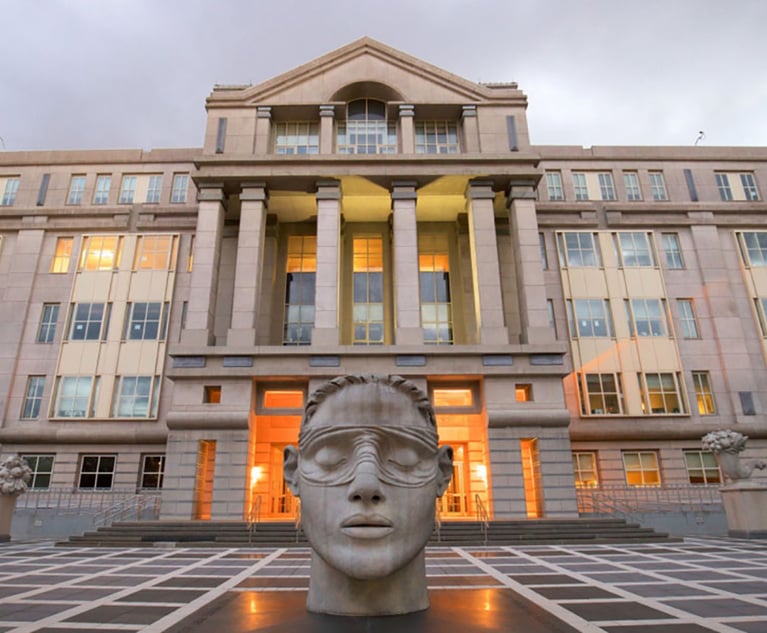Pressure Mounts for Federal Legislation Protecting Businesses from COVID-19 Lawsuits, But Don't Count on It
Legislation to immunize businesses from a deluge of coronavirus-related lawsuits would be welcome, but several factors make it uncertain, if not unlikely.
May 14, 2020 at 12:30 PM
5 minute read

A handful of cases have been filed against employers around the country, alleging that employees and customers were exposed to coronavirus through negligent corporate policymaking and lax enforcement. As stay-at-home orders begin to be lifted in some regions, many are expecting this trickle of COVID-19 exposure lawsuits to turn into a deluge, inundating businesses that have already been weakened by the unprecedented economic downturn that the pandemic has caused. To save businesses from this deluge, and bolster their ability to recover, many are advocating broad federal legislation limiting the liability of companies as they try to adapt to the pandemic.
There is already a patchwork of federal and state protections that limit liability for certain health-care providers, manufacturers, and volunteers. For example, the Secretary of HHS used his authority under the 2005 PREP Act to confer limited immunity from liability to certain manufacturers and health-care providers against any claim of loss resulting from the manufacture, distribution, administration, or use of medical countermeasures. The recently passed CARES Act also confers limited immunity on health-care volunteers responding to the pandemic. And some states have also acted to limit the exposure of medical professionals to liability. Governor Cuomo of New York, for example, issued Executive Order 202.10, which limits the civil liabilities of medical practitioners responding the pandemic. Other states, including New Jersey, have taken similar actions.
More recently, on April 28, President Trump announced his intention to sign an executive order to solve "any liability problems" that could prevent meat-processing companies from staying open amid the pandemic.
But these limited grants of immunity will not protect most businesses from potential COVID-19 lawsuits. No law has been passed to protect regular businesses from lawsuits brought by employees or customers who claim they were exposed to the disease because of the company's actions or inactions.
In an open letter to its members issued in April, the U.S. Chamber of Commerce described "exposure liability" as "perhaps the largest area of concern for the overall business community," and advocated protections for companies that follow CDC guidance. That same week, White House economic adviser Larry Kudlow told CNBC that liability reform would be a "very important part" of the nation's recovery. Within days, the Editorial Board of the Wall Street Journal warned of a second epidemic—a "lawsuit epidemic"—and urged Congress to create a safe harbor for businesses operating in good faith.
Despite this mounting pressure for coronavirus liability protection, there is no specific legislation on the horizon, and businesses cannot count on any being enacted. Some have proposed, for example, that business liability could be controlled through a compensation scheme similar to the Victim Compensation Fund established following the 9/11 terrorist attacks. The 9/11 Fund was widely praised as a success, and on its face duplicating that effort would be an appealing solution now. But the practical challenges to implementing such legislation to address the COVID-19 pandemic are significant.
First, the 9/11 Victim Compensation Fund did not grant full immunity from lawsuits. Rather, victims of the terrorist attacks were required to waive their right to file civil claims as a condition of their participation in the Compensation Fund. As a practical matter, most of the victims chose to participate in the Compensation Fund, and most civil litigation over the attacks was avoided. Whether potential COVID-19 plaintiffs would make that same choice now might depend on myriad factors that cannot be readily foreseen, including the overall funding levels of any such compensation fund and the chances of winning a greater recovery in private litigation.
Second, the scale of the pandemic is far greater. The 9/11 attacks claimed approximately 3,000 individuals—an enormous toll of human lives. But the COVID-19 pandemic has already claimed more than 50,000 lives in the United States, and that number is growing every day. The size of any compensation fund would, therefore, have to be many times larger in order to incentivize victims to choose to participate in the fund and waive all civil claims. Since the federal government has already spent trillions trying to ameliorate the economic effects of the pandemic, the creation of a fund of that size is unlikely.
Finally, the 9/11 Victims Compensation Fund was created in a time of political unity throughout the nation. Legislation to protect businesses from lawsuits is unlikely to attract similar bipartisan support today—particularly in a politically divided election year.
Legislation to immunize businesses from a deluge of COVID-19 lawsuits would be welcome, but these factors make it uncertain, if not unlikely. As businesses prepare for the lifting of stay-at-home orders throughout the country, they should not assume that they will be immune from civil claims from employees or customers who catch the virus. Companies must scrupulously follow all guidelines published by the CDC, as well as state and local authorities. These guidelines will likely become the de facto benchmarks for how businesses ought to respond to the pandemic. Civil juries may someday judge the reasonableness of company's conduct based on compliance with these guidelines.
Thoman Kane is a member in the Litigation and Health Care and Life Sciences practices of Epstein Becker Green in Princeton. Maximilian D. Cadmus is an associate in the firm's Litigation & Business Disputes practice.
This content has been archived. It is available through our partners, LexisNexis® and Bloomberg Law.
To view this content, please continue to their sites.
Not a Lexis Subscriber?
Subscribe Now
Not a Bloomberg Law Subscriber?
Subscribe Now
NOT FOR REPRINT
© 2025 ALM Global, LLC, All Rights Reserved. Request academic re-use from www.copyright.com. All other uses, submit a request to [email protected]. For more information visit Asset & Logo Licensing.
You Might Like
View All
Gibbons Reps Asylum Seekers in $6M Suit Over 2018 ‘Inhumane’ Immigration Policy
3 minute read
Lawyers' Phones Are Ringing: What Should Employers Do If ICE Raids Their Business?
6 minute read
'Younger and Invigorated Bench': Biden's Legacy in New Jersey Federal Court
5 minute read
3rd Circuit Strikes Down NLRB’s Monetary Remedies for Fired Starbucks Workers
Law Firms Mentioned
Trending Stories
Who Got The Work
J. Brugh Lower of Gibbons has entered an appearance for industrial equipment supplier Devco Corporation in a pending trademark infringement lawsuit. The suit, accusing the defendant of selling knock-off Graco products, was filed Dec. 18 in New Jersey District Court by Rivkin Radler on behalf of Graco Inc. and Graco Minnesota. The case, assigned to U.S. District Judge Zahid N. Quraishi, is 3:24-cv-11294, Graco Inc. et al v. Devco Corporation.
Who Got The Work
Rebecca Maller-Stein and Kent A. Yalowitz of Arnold & Porter Kaye Scholer have entered their appearances for Hanaco Venture Capital and its executives, Lior Prosor and David Frankel, in a pending securities lawsuit. The action, filed on Dec. 24 in New York Southern District Court by Zell, Aron & Co. on behalf of Goldeneye Advisors, accuses the defendants of negligently and fraudulently managing the plaintiff's $1 million investment. The case, assigned to U.S. District Judge Vernon S. Broderick, is 1:24-cv-09918, Goldeneye Advisors, LLC v. Hanaco Venture Capital, Ltd. et al.
Who Got The Work
Attorneys from A&O Shearman has stepped in as defense counsel for Toronto-Dominion Bank and other defendants in a pending securities class action. The suit, filed Dec. 11 in New York Southern District Court by Bleichmar Fonti & Auld, accuses the defendants of concealing the bank's 'pervasive' deficiencies in regards to its compliance with the Bank Secrecy Act and the quality of its anti-money laundering controls. The case, assigned to U.S. District Judge Arun Subramanian, is 1:24-cv-09445, Gonzalez v. The Toronto-Dominion Bank et al.
Who Got The Work
Crown Castle International, a Pennsylvania company providing shared communications infrastructure, has turned to Luke D. Wolf of Gordon Rees Scully Mansukhani to fend off a pending breach-of-contract lawsuit. The court action, filed Nov. 25 in Michigan Eastern District Court by Hooper Hathaway PC on behalf of The Town Residences LLC, accuses Crown Castle of failing to transfer approximately $30,000 in utility payments from T-Mobile in breach of a roof-top lease and assignment agreement. The case, assigned to U.S. District Judge Susan K. Declercq, is 2:24-cv-13131, The Town Residences LLC v. T-Mobile US, Inc. et al.
Who Got The Work
Wilfred P. Coronato and Daniel M. Schwartz of McCarter & English have stepped in as defense counsel to Electrolux Home Products Inc. in a pending product liability lawsuit. The court action, filed Nov. 26 in New York Eastern District Court by Poulos Lopiccolo PC and Nagel Rice LLP on behalf of David Stern, alleges that the defendant's refrigerators’ drawers and shelving repeatedly break and fall apart within months after purchase. The case, assigned to U.S. District Judge Joan M. Azrack, is 2:24-cv-08204, Stern v. Electrolux Home Products, Inc.
Featured Firms
Law Offices of Gary Martin Hays & Associates, P.C.
(470) 294-1674
Law Offices of Mark E. Salomone
(857) 444-6468
Smith & Hassler
(713) 739-1250






